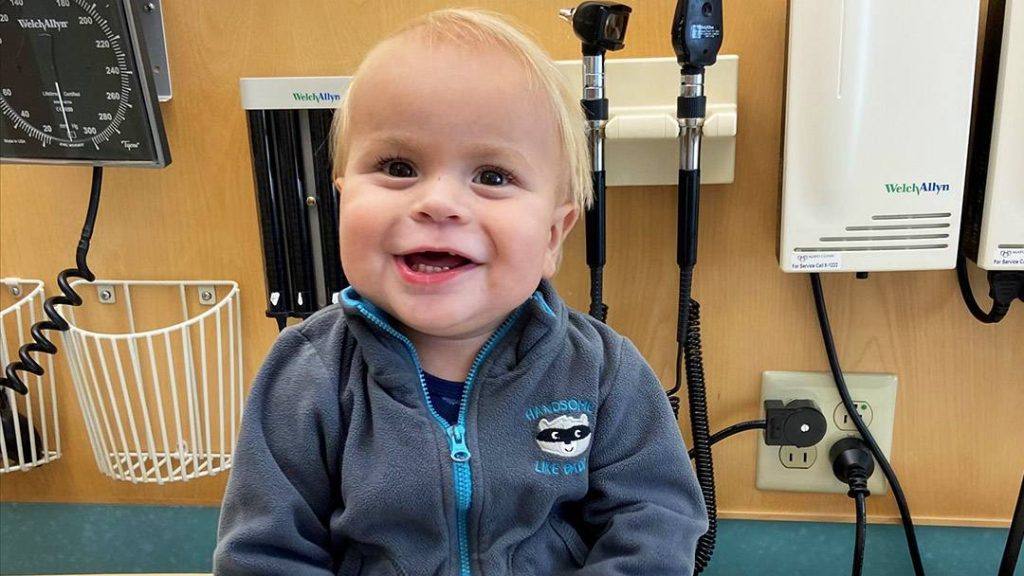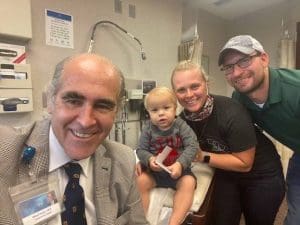Gabriel Ryan wasn’t supposed to live. Today, he is thriving

Eric and Micayla Ryan were experienced parents. They had three children already and thought this ultrasound would be as routine as the ones that had come before. They knew what to expect.
Or so they thought.
But instead of reassurance, this ultrasound revealed a problem: cysts on the kidneys of the Goodhue, Minnesota, couple’s fourth child. Their doctor arranged for the Ryans to meet with specialists at Mayo Clinic in Rochester, some 30 miles away, to learn exactly what that meant.
After a 2.5 hour ultrasound, maternal-fetal medicine specialists in Rochester gave the couple difficult news. Their baby had bilateral polycystic kidney disease. The diagnosis is usually a death sentence.
“Most babies with this disorder end up without enough amniotic fluid to breathe,” Eric says. “If there’s not enough amniotic fluid, the baby’s lungs can’t develop.”
Doctors prepared the Ryans for the worst. They were told they’d likely be able to hold their newborn at most for just a few short days.
Despite the grim prognosis, the Ryans held out hope. They decided to find out the sex of their child — a boy — something they’d not done in previous pregnancies.
“It was a way for us to know him,” Micayla says. They named their son Gabriel, after the angel who in the Bible told Mary she would become the mother of Jesus. “In the Bible, Gabriel is the bringer of good news,” Micayla says.
The name proved a fitting choice. “Gabriel has done nothing but bring us good news,” she says.
Reason to believe
The good news began coming almost immediately. At each ultrasound appointment, the Ryans would learn that Gabriel’s amniotic fluid was holding strong. He made it to 26 weeks. Then 28. And 31.
At 37 weeks, with just a tiny pocket of amniotic fluid left close to his face, doctors told the Ryans it was time to bring their boy into the world.
Gabriel Ryan was born on March 17, 2020. In spite of the dire predictions, he initially thrived.
“We’re so grateful to everyone who took care of Gabriel. Dr. Prieto gave us hope when it was hard to come by. The NICU nurses took care of Gabriel like he was their own.“
Micayla Ryan
“He did so well,” Micayla says. “He was only intubated for a few hours. His lungs were great. He was able to urinate.”
But Gabriel’s kidneys were still an issue. An early infection necessitated dialysis. And while he was eventually discharged from the hospital, the Ryans knew they’d be back. Gabriel would need a kidney transplant to survive. But he’d need to gain weight before he could have the life-saving surgery.
“We needed to get him to 10 kilos — about 20 pounds — before he could have a transplant,” Eric says. “We were hoping to get him there without having to go back on dialysis.”
Kidney for life

Eric had volunteered to donate a kidney to Gabriel. But his kidney was too large. So Gabriel’s surgeon, Mikel Prieto, M.D., recommended the Kidney for Life program.
“Eric described it as a ‘kidney deal,'” KARE 11-TV reports. “He would donate his kidney, which was too big for his son, and in return, Gabriel would be matched with a donor best suited for his body.”
In September 2021, doctors told the Ryans they had a kidney for Gabriel. The organ came from a woman who was donating a kidney on behalf of a friend. Though she wasn’t a match for her friend, she was a perfect match for Gabriel. Through Kidney for Life, her gift ensured her friend would also receive a life-saving organ.
Gabriel’s transplant took place on Sept. 15. He went home to join his siblings — Isaac, Millie and Mabel — just six days later.
“He’s been trying new foods, exploring,” Micayla says of life after transplant. “We thought he was happy before, but now it’s like a curtain has been lifted.”
Gabriel has enthusiastically embraced life on his parents’ dairy farm, riding tractors and skid loaders with his dad. He’s keeping up with his older siblings and looking forward to becoming a big brother himself this spring.
The Ryans are grateful to everyone who made all of that possible.
“We’re so grateful to everyone who took care of Gabriel,” Micayla says. “Dr. Prieto gave us hope when it was hard to come by. The NICU nurses took care of Gabriel like he was their own. We had to leave him at the hospital for 56 nights. Our hearts were on the line. We’d come back, and one of the nurses would be holding him. That meant the world to us.”
###
This story originally appeared on the “In the Loop” blog
